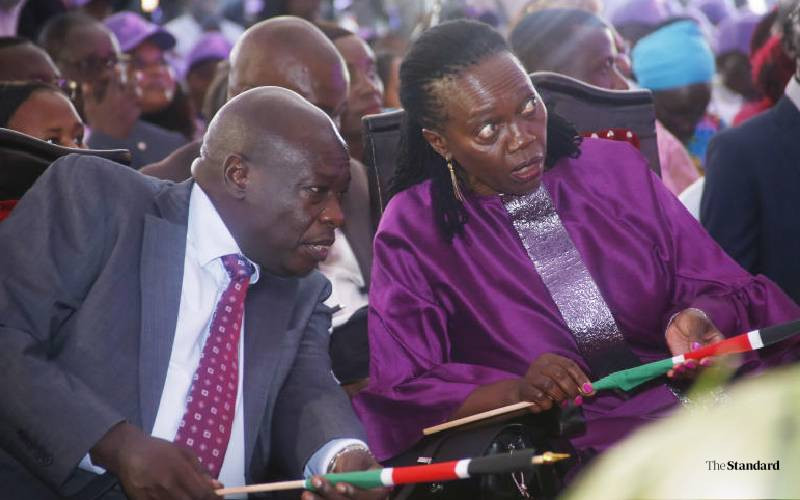EXPLAINER: How a party can exit a coalition, steps to be taken

The Democratic Party of Kenya (DP) associated with Public Service Cabinet Secretary Justin Muturi issued Wednesday a 30-day notice to exit the Kenya Kwanza.
In a letter addressed to the chairperson of the Kenya Kwanza Coalition secretariat, the party noted that its stay in the coalition was no longer tenable.
“Kindly take notice that our stay in Kenya Kwanza coalition is no longer tenable due to the prevailing political developments,” the letter by DP Secretary General Jacob Haji reads.
“This notice is effective from the date of this letter,” it adds.
The letter has been copied to the Registrar of Political Parties and Secretary Generals for Ford Kenya, United Democratic Alliance (UDA), and Maendeleo Chap Chap respectively.
Muturi signed the pre-election deal to join the Coalition on April 9, 2022, a few months to the General Elections.
Let’s understand mergers, coalitions and how a party can exit.
A merger is the combination of two or more political parties into a single party (new or existing)
A coalition means an alliance of two or more political parties formed for the purpose of pursuing a common goal.
There are pre-election and post-election coalitions.
The political party follows its constitution and procedures and makes the decision to enter into a coalition. The coalition agreement is then signed and deposited with the Registrar. The coalition agreement must contain details on:
- No candidate is nominated on a coalition ticket
Exiting a coalition
Muturi’s DP becomes the first party to express its intention to quit Kenya Kwanza.
In the case of Kenya Kwanza, a party must give a 30-day notice.
This is stipulated in the termination clause (8) of the coalition agreement.
For Azimio, no constituent party can exit for at least a year.
This is contained in Article 22 of the Azimio agreement on the 'Withdrawal of Parties'.
It also provides that no party can bolt out of the coalition at least six months to the general election.
It, however, states that it can do so at least three months after the elections.
Even then, a party that wishes to exit can only do so after giving a 90-day notice to the coalition council, which is the second-highest organ of the coalition.
Registrar of Political Parties (RPP) Ann Nderitu confirmed Wednesday it had received the letter from DP.
On February 26, Nderitu also confirmed that five political parties have officially left the Azimio la Umoja coalition following the 2022 general elections.
They are the People's Liberation Party (formerly Narc-Kenya), Maendeleo Chap Chap party (MCC), United Democratic Movement (UDM), Devolution Empowerment Party (DEP), and Pamoja African Alliance (PAA).
What is a coalition political party?
Two or more political parties may form a coalition political party before or after an election.
A coalition political party is a coalition registered as a political party that is exempted from Sections 5 and 6 of the Political Parties Act, 2011 (PPA).
This includes the requirements the publication of the notice of intention for provisional registration in the Gazette and two newspapers with nationwide circulation for purposes of inviting objections
This is in line with the Amendment of section 7 of No. 11 of 2011 (Section (76) of the PPA).
Currently, Azimio la Umoja One Kenya is the registered coalition political party while Kenya Kwanza Alliance and Taifa Democratic Coalition are the registered coalitions.










